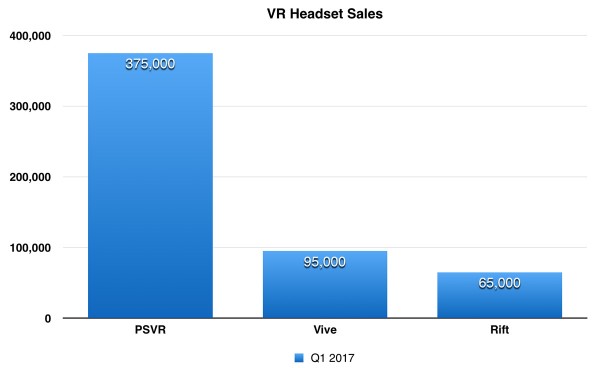
VR in general isn’t the darling many in the tech community had hoped for but that shouldn’t be surprising seeing how the tech still needs refinement. On top of that, content, though there is a steady supply, still isn’t what it should be in order to attract consumers in much larger quantities towards the new medium. Still, between the three major players in VR, Sony is by far doing the best as you can see from the above chart. From gameindustry.biz:
Sony has been more vocal about the PSVR being about VR, not games. They are working with companies for commercial applications, even though it is not the obvious first choice. But even the PlayStation is part of a larger effort to bring an entertainment ecosystem into the home – not just gaming experiences. They are going to the same route with the PSVR.
In general and perhaps ironically, despite the fact that it’s an industry darling, it’s Oculus who is doing the worst, even with a price cut:
It’s also worth noting that, even with a price cut for Oculus in late February, the Rift could not outsell HTC Vive in Q1. The Vive sold 95,000 compared to 64,000 for the Rift. For the full year, SuperData anticipates Vive to outsell Rift, 553,000 vs 346,000 units. Llamas attributes this success in part to HTC’s open approach to the marketplace.
And this isn’t surprising. At the price point that all these products currently exist in, it’s not about the price but the experience. Once we get into more mass market adoption, yes price will be a factor, but in the days of the early adopters, they’ll pay the price if what they’re getting from it is something they haven’t seen before. Compared to the pack, PlayStation VR is currently offering enough unique experiences like Resident Evil that helps to set it apart, on top of easy integration which is mostly plug and play.
It’s not about price. Facebook is a digital services company, not a hardware company. Oculus is a brand new OEM. The manufacturing challenges have proven enormous for them, forcing them to hire former Fitbit COO Hans Hartmann this time last year. But this plus bad press, their Zenimax lawsuit and closed ecosystem comes from their ‘Oculus first’ mentality, making it much harder for them to compete with HTC Vive, which has always been ‘VR first’. HTC Vive didn’t get as caught up in focusing on games either – they have long supported all aspects of VR development, so Oculus is behind them there.
Also, hiring the former head of Fitbit isn’t really a catch, is it?
Fitbit’s business is starting to look more and more like GoPro’s pic.twitter.com/sTs3OHDn28
— Jan Dawson (@jandawson) May 3, 2017

You must be logged in to post a comment.